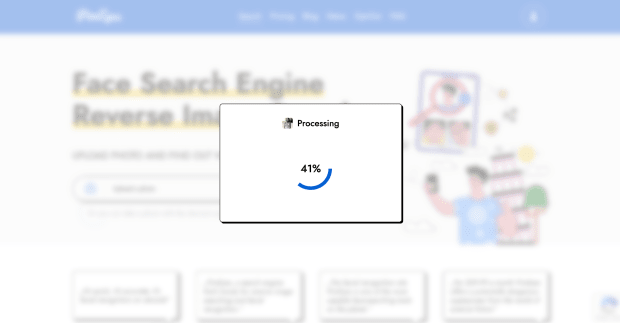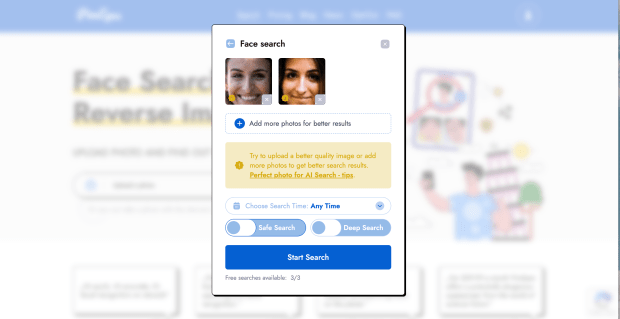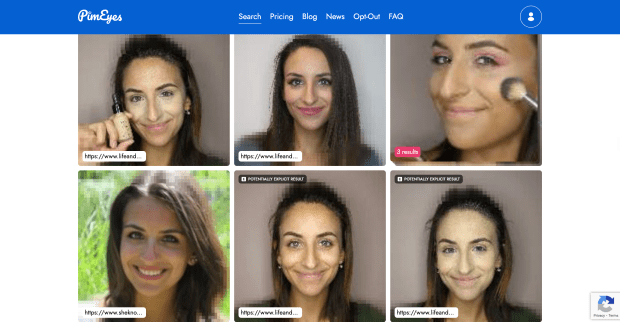This Website Can Find Every Photo of You Online—in 15 Seconds, It Found 100+ Shots I Didn’t Even Remember Existed
Here's my PimEyes review—plus, what an expert says about the AI technology.
Back in 2012, I was a junior in college and had just started a blog. No niche, no target audience. I just wanted to write—or rather, blog. So, I put on my cutest top and a bubble necklace (a sign of the times) and had my mom take my "headshot" while I stood in front of unmanicured beach grass. Fast forward a decade later and I had totally forgotten that image existed—until it popped up on PimEyes, a website that uses AI to recognize your face and find every picture of you. Even the ones you didn't know existed...
I don't like it. I don't like it at all. And yet, there I was: 2012, the beach grass and the bubble necklace. Where was this photo? Did I even have this pic on my desktop anymore? Did it get into the cloud? How, where, why—AI?!
Related: Why Is April 24 Trending on TikTok? Here Are the Disturbing Details for Parents and Women To Know
For some context, PimEyes has a free version that you can use up to three times for three separate searches. After that, premium pricing starts at:
Open Plus plan: $29.99/mo for one-month access, 25 searches daily, and three PimEyes alerts when your photo appears on a site
PROtect plan: $79.99/mo for the PROtect plan (one-month access, 25 searches daily, 15 PimEyes alerts, and 80 automatic DMCA and GDPR Takedown Notices
Advanced plan: $299.99/mo for one-month access, unlimited searches, 500 PimEyes alerts, deep search, and PDF and CSV results exporting
They explain on their site: "Find a face and check where the image appears online. Our face finder helps you find a face and protect your privacy. Facial recognition online system allows you to search by image. PimEyes is a face picture search and photo search engine available for everyone. It is a great tool to audit copyright infringement."
Related: 'M*A*S*H' Stars Hold Table Read for New Scene Written By AI

It's weird and unsettling but let's not forget, Google Image Reverse Search has existed for years. PimEyes seems to be a version of that—on steroids.
Is facial recognition going too far?
It's one of the most searched-for questions on the internet. AI-developed facial recognition—which, beyond a tool like PimEyes, also refers to identifying a person not by a fingerprint or a password, but by their actual face—is 99 percent accurate across Black male, Black female, white male, and white female demographics (depending on the algorithm), according to a 2022 evaluation.
I reached out to Richard Gardner, CEO of Modulus, to either confirm or deny my AI-induced anxieties. Gardner has been a globally recognized subject matter expert for more than two decades, offering complex insight and analysis on AI and software development. Modulus has built tech for clients like NASA, NASDAQ, Yahoo!, Microsoft and more. It's also the largest holder of FinTech IP (financial technology intellectual property) on the planet.
Related: What You Need to Know About Artificial Intelligence
"There are a number of reasons to be concerned about how AI-powered search technology will affect privacy on the internet," Gardner tells Parade. "While it is generally accepted that data privacy is at an all-time low, consumers typically opt-in to privacy traps by having social media accounts, sharing photographs and the like. With AI processing incredibly large amounts of data to work effectively, it can easily be utilized to identify people in photos who don’t wish to be identified or tagged."
And that brings us to that 99 percent effective algorithm. Sure, it's intelligent, but is it human enough to characterize what should and shouldn't be identified for the sake of privacy?
Related: Be Wary of These 15 Common Facebook Marketplace Scams
"The algorithms at use are another concern," Gardner says. "Will the algorithm be able to distinguish between public and private photographs?"
It remains one of AI's biggest questions.
With that in mind, I still decided to go through with this—"this" being searching my own image with PimEyes. I logged onto the free version, which only allows for a soft search—or "safe search." Deep searches are only accessible to Advanced plan members and I'm not interested in shelling out $299.99 right now.
Related: These Were the 100 Most Common Passwords Used in 2022, See If Yours Made the List
First, I searched by uploading one photo of myself. The results were relatively limited and I wasn't too impressed. The 2012 blogger shot of me was there and sure, I was creeped out, wondering where this photo was still living on the web, but what I had been anticipating was way worse—college photos where I was drinking in the background or maybe security footage of me cashing out at a bank ATM.
I guess by expecting the worst, the actual results didn't seem too terrifying.
I toggled back and uploaded a second selfie, wondering if that would increase the accuracy of the soft search. This time, I got nervous. I hesitated before pressing "Start Search," my mind absolutely racing.

PimEyes
What if I saw something I didn't want to see? What if the robots knew something I didn't? What if I use this artificial intelligence program to search for my face and I find a revealing pic that someone had taken without my knowledge?
Related: Is My Money Safe in the Bank? Here's What's Covered and What To Know
It doesn't matter if you've never sent a nude photo in your life. For me, there wouldn't even be anything out there for the robots to find. At least, nothing I'm aware of... So, why were my palms sweating so badly? Was there? Is there? Something to find, I mean...
What if someone pulled that Catfish trick and hacked into my laptop or phone camera, uploading hours of footage of me changing in front of my screen? Videos of me showering while I innocently propped my phone up to play music? All without my consent? *Shudders*
I briefly thought about covering my cameras with tape again. So 2014, but still.

PimEyes
Luckily, PimEyes didn't pull up anything too horrifying although some of the pics—there were 123 total, some of which were duplicates—were labeled with a "potentially explicit" warning. Technically, the websites themselves that hosted these innocent pics (most of which were from old makeup tutorials I had posted) could somehow be connected to explicit content. But the free version doesn't provide links to the actual website that hosts the photo. If you want that feature, you gotta pay up. So, I couldn't say for sure.
Related: We Asked ChatGPT To Give Us a List of Baby Names Inspired by Taylor Swift—and It Did Not Disappoint
The free version doesn't do a "deep search" either, so theoretically, there could be more photos out there in the AI-sphere but for now, the soft search is enough for me. It's worth noting, too, that all of the 123 pictures that came up were ones I uploaded and/or took myself.
No ATM candids, no selfies sold by Snapchat (God help us all if Snap and PimEyes ever get together to exchange information). Nothing sneaky.
As petrifying as it is, PimEyes can also be used for good. As Twitter user Kristen Ruby points out, it can be helpful in detecting photos posted without her consent. However, as Twitter user Soo Schreiber points out, it caters to illicit intentions too.

So, on the one hand, it can work as a critical tool in the age of revenge porn, and on the other, it could hand you over to stalkers on a silver platter. But the same can be said for any social media platform, right? Isn't that the entire argument of the Netflix show, You?
"The most important thing that consumers should know is that they should be cautious when granting permission to share their personal data and photographs with external companies," Gardner adds. "Be sure to understand how your data will be used."
Nerve-wracking as a tool like this is, it appears that PimEyes can be used for both good and evil. However, it's unclear at this point in time which one will prevail over the other.
Next up, the AI-cloning scam that everyone in your family needs to know about.
Source
Richard Gardner, CEO of Modulus
